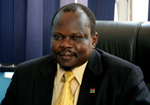
With a short five months to go until South Sudan’s referendum, the prospects of a free, fair, and credible vote appear dim. Preparations for the vote on whether the South will become an independent state have barely begun while the two Sudanese ruling parties appear irreconcilably divided on issues that have thus far prevented the two parties from moving forward.
Yesterday in the South Sudan capital of Juba, leaders of the southern ruling party the SPLM, met for a fourth straight day—no doubt to figure a way out of the current mess, made worse by recent remarks from northern officials who are raising the possibility of a referendum delay. Over the weekend, one NCP official was quoted as saying that the body tasked with managing the vote, the South Sudan Referendum Commission, had recommended a delay because of insufficient time to prepare for the referendum. While this recommendation remains only a claim, with no official affirmation or denial from the commission itself, one southern leader has made it clear that postponement is not an option. AP reports that Secretary General of the SPLM Pagan Amum said his party would pursue “other options” rather than accepting a postponement. Amum also warned of the potentially hostile reactions from the population should a delay take place, as the “hopes, expectations and aspirations of the people” are “pinned on that day.”
Meanwhile, chairman of the referendum commission Mohamed Ibrahim Khalil, whose appointment was reportedly put forth by the northern government, threatened to resign yesterday, complaining to Reuters about the commission’s lack of progress, which has been at a standstill over the appointment of the body’s secretary general for weeks. (All other major positions on the commission have been filled.) According to him, the five southern members on the commission are the ones to blame for the quagmire by voting as a block to prevent any northerners from taking the post.
Khalil said to Reuters:
This (commission) can only work if we can get people to be cooperative to have mutual trust … and to approach things objectively from a national point, not from the point of view of north and south.
Of course, only nominating northern candidates for the secretary general position (then complaining when the southern members won’t approve the nomination) does not exactly exemplify a national point of view either and sounds just as obstructionist as Khalil claims the SPLM is being. According to an email from Ezekiel Gatkouth, head of South Sudan’s mission to the U.S., the secretary general of the commission was supposed to be a southerner, while the chairman would be a northerner—implying that a deal had been made between the SPLM and the NCP. The secretary general’s responsibilities revolve around the commission’s budget and administration, but further details regarding the position’s duties and powers will be up to the commission to decide.
Rhetoric aside, delaying the referendum may increasingly become the only practical option if the two parties continue to disagree, as necessary preparations like voter registration and civic education program have yet to begin. Such a decision would be politically challenging for the SPLM, whose political legitimacy hinges so deeply on delivering the referendum, seen as a vote for independence to its population. Conversely, a poorly-executed vote that is rammed through risks being seen as illegitimate, and its result unrecognized. Given these pressures, the SPLM may well decide to compromise on the secretary general question to move referendum preparations forward. SPLM’s Gatkouth indicated that arrangements to break the stalemate should be forthcoming, so stay tuned.
Photo: SPLM Secretary general Pagan Amum (AP)

